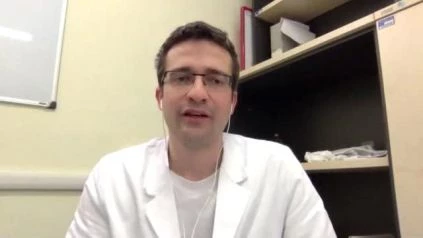Matteo Lambertini, MD, Ph.D. from San Martino Hospital Genoa and the University of Genoa speaks about the Exploratory Analysis: Unexpected findings on weight loss and breast cancer from international study in JNCCN.
Link to Press Release:
https://www.eurekalert.org/pub_releases/2021-02/nccn-ufo021621.php
In a report published in the February 2021 issue of JNCCN—Journal of the National Comprehensive Cancer Network, researchers looked at BMI data for people with HER2-positive early breast cancer and discovered that a 5% weight loss in patients over two years was related to worse outcomes. Over the same time span, weight gain had little effect on survival rates.
“The finding that weight loss, and not weight gain, was associated with worse outcomes is unexpected,” said lead researcher Samuel Martel, MD, Universitè de Sherbrooke, Quebec, Canada, who worked with researchers in Belgium, Brazil, Germany, Italy, Switzerland, and the United Kingdom, as well as the National Cancer Institute and the Mayo Clinic in the United States. “We were unable to make a distinction between intentional versus unintentional weight loss, so it’s a matter of speculation whether worse outcomes were due to weight loss, or vice versa. We hope our findings highlight the importance of incorporating consecutive and prolonged data collection on weight in oncology trials and gaining greater understanding of the metabolic processes after cancer diagnosis that may impact outcomes.”
The BMI data came from the ALTTO BIG 2-06 study, which obtained height and weight data from 8,381 patients with HER2-positive early breast cancer who were treated with trastuzumab and/or lapatinib plus chemotherapy. At the start of therapy, 2.2 percent were underweight, 45.3 percent were average weight, 32.1 percent were overweight, and another 20.4 percent were obese—defined as a BMI greater than 30. Initial obesity was related to worse outcomes, such as more frequent and severe adverse effects leading to medication discontinuation and lower overall survival rates.
“It was surprising to see that more than 5% weight loss at 2 years was associated with poorer distant disease-free survival. Is our general advice to obese/overweight patient to exercise and lose weight wrong?” questioned Anthony D. Elias, MD, University of Colorado Cancer Center, a member of the NCCN Clinical Practice Guidelines (NCCN Guidelines®) Panel for Breast Cancer. “Careful examination of the Kaplan-Meier hazard plots suggests that the relapse curves for those with weight loss are steeper in the second and third years of follow-up, but thereafter are relatively parallel. It’s possible that the weight loss observed early may be an indication for impending relapse of breast cancer.”
The research emphasizes the significance of weight loss in cancer survivorship. The authors hope that their results will serve as a foundation for future research and oncology trials aimed at guiding weight management during survivorship.
### ### ### ###
Visit JNCCN.org to read the entire report. Until May 10, 2021, you can get free access to “Body Mass Index and Weight Change in Patients With HER2-Positive Early Breast Cancer: Exploratory Analysis of the ALTTO BIG 2-06 Trial.”

